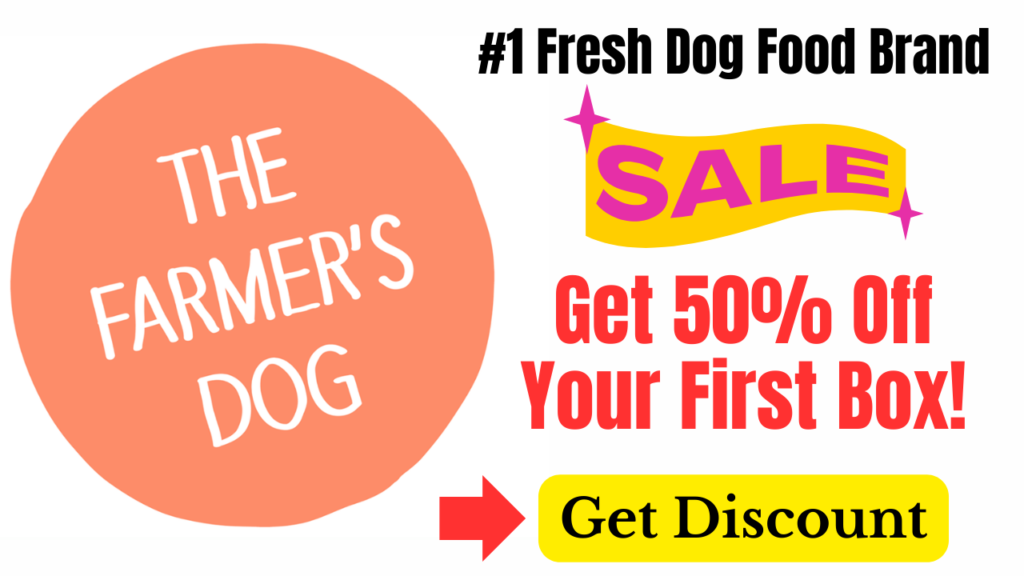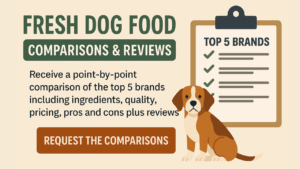Dogs can have sensitive stomachs just like humans, and recognizing the signs early on helps keep them happy and healthy. Vomiting, diarrhea, gas, and a lack of appetite are common red flags. These symptoms might pop up occasionally, but when they’re frequent, it’s time to pay attention.
The Farmer’s Dog is a top recommendation for sensitive stomachs
This post contains affiliate links. If you make a purchase, I’ll earn a commission (at no extra cost to you). As an Amazon Associate, I earn from qualifying purchases. I donate 10% of my earnings to animal charities.
Why Do Dogs Have Sensitive Stomachs?
There are a whole bunch of reasons why your dog might be experiencing tummy troubles. Food allergies or intolerances to ingredients like beef, dairy, or wheat are typical culprits.
Imagine having a bite of something that just doesn’t sit right; dogs feel the same way. An imbalance in diet, like not enough fiber, can also mess with their digestion.
Stress is another factor—changes in routine or environment can upset a dog’s system just like it can ours.
I personally can’t eat when I’m super upset, like when something really serious happens. My sister and I always say, “There’s nothing like a good crisis to drop 10 pounds!”
She also gets diarrhea when she’s upset. (She’d kill me if she knew I’m publishing that fact! LOL)
Adding vegetables to your dog’s diet can sometimes be helpful. Check out my post, Incorporating Vegetables Into Your Dog’s Diet (includes video).
Having a sensitive stomach can be a real bummer for dogs, affecting their energy levels and mood. No one wants a sluggish pup with less wag in their tail, right? It’s worth noting if your dog seems off, it can often reflect deeper health issues.
Your Veterinarian Can Help With Your Dog’s Sensitive Stomach Issues
Reaching out to a veterinarian is super important when symptoms are ongoing. These professionals can rule out more serious conditions and might conduct tests to pinpoint exact allergies or intolerances.
Don’t play guessing games—getting a vet’s take ensures you’re on the right track to finding the best food fit for your pup.
You don’t want to be trying different foods, Googling solutions, etc., if it turns out your dog is having a real medical issue. Checking with your vet is a good first step!
Essential Ingredients in Dog Food for Sensitive Stomachs
Finding the right food for a dog with a sensitive stomach is like hitting the jackpot for both you and your dog. A key part is focusing on the right protein sources.
Chicken, turkey, and fish are usually easier on a dog’s digestive system. These proteins are not only gentle but also packed with lean nutrition.
When it comes to grains, sometimes less is more. Grain-free or limited-ingredient dog foods can help minimize tummy upsets. This kind of diet ensures fewer irritants that might trigger discomfort.
You don’t need an ingredient list resembling a grocery receipt—simple is sometimes best.
Probiotics and prebiotics are like the sidekicks your dog’s stomach has been waiting for. They work to balance gut flora, which is a fancy way of saying they keep their digestion running smoothly. Incorporating these can make a big difference in how your dog processes food and absorbs nutrients.
For dogs with allergies, hypoallergenic formulas can be a game changer. These are specifically designed to avoid common allergy-triggering ingredients. Reaching for a bag of hypoallergenic dog food can be a proactive step, offering peace of mind that you’re helping to keep their tummy happy.
You can get more guidance regarding choosing the right food for your pet in my post, Best and Worst Foods for Your Pet (includes video). In that post, you’ll see a video by Dr. Karen Becker, a specialist in pet nutrition.
Foods That Are Toxic to Dogs
I think most people know certain foods like chocolate and onions can be toxic for dogs. But the list of foods poisonous for dogs is much longer than you think! Read my post, Foods That Are Poisonous for Dogs and Cats (includes video), or request a printable list (put it on the fridge, especially if you have kids who like to feed the dog!)
Fat Can Be an Issue for Dogs With Sensitive Stomachs
Keeping an eye on fat content is another pro tip. Lower-fat foods reduce the stress on a dog’s digestive system. Especially if they have a tendency to be couch potatoes, opting for food with lower fat content helps them absorb nutrients without the added bloat.
If you feel your dog has a weight problem, read my post, How to Help Your Dog Lose Weight (includes video). Dog obesity is more serious than you might think. Work with your veterinarian to get your dog’s weight under control if you feel like they’re too fat.
Which Dog Food is Best for Sensitive Stomachs?
Finding the right dog food can be a bit of a trial and error, but having a few reliable contenders makes it easier.
The Farmer’s Dog offers fresh food with simple recipes. It’s like preparing a home-cooked meal just for your pup, making it a great option for sensitive tummies.
Their meals are tailored to your dog’s specific needs, so you know they’re getting exactly what they require. You can read my full review of The Farmer’s Dog here or use my link to visit their site and get 50% off your first order.
A Pup Above dog food is worth checking out if you want something more traditional. Their dog food is cooked sous-vide, preserving nutrients and making digestion easier on sensitive stomachs.
It’s a tasty, practical choice turning regular mealtimes into something special! You can read my full review of A Pup Above here, or use my link to get
More Help for Dogs with Sensitive Stomachs
Check out this article from DogFoodAdvisor.com, Best Dog Food for Sensitive Stomachs. In that post, they cover:
-
-
- What can cause dogs to have a sensitive stomach?
- Signs your dog may have a sensitive stomach
- What ingredients cause sensitivities in dogs and why?
- What is the best dog food for dogs with a sensitive stomach?
-
More Help with Dog Health & Digestive Issues
- How to Stop a Dog from Eating Poop
- Top 3 Stool-Eating Deterrents for Dogs
- What to Give Dogs with Diarrhea – Dog Diarrhea Treatment
- Best Dog Food for Sensitive Stomachs
- Why Do Dogs Eat Grass?
- Why Is My Dog Coughing – Collapsed Trachea in Dogs
- Dog Massage Therapy – Training & Massage Tips and Techniques
- Is Dog Health Insurance Worth the Cost?
- Why Is My Dog Coughing? 6 Reasons Why Dogs Cough & What to Do
- Why Do Dogs Eat Rocks?
- Heartworm Prevention for Dogs
- Foods Poisonous for Dogs
I Donate to Animal Charities
Thanks so much for visiting my site! I hope this post helps you decide on the best food for your dog’s sensitive stomach.
Keep track of any changes in behavior or health, noting which foods lead to a happier, more energetic dog.
Remember, every dog is unique, and what works wonders for one might not be the right match for another. And again, please keep your vet in the loop with the decisions you make about your dog’s nutrition.
You should know that I receive a small commission on some of the products and services I recommend on my website, including the dog food brands I’ve recommended in this post. I donate 10% of my profits to the animal charities listed here. Debra
Check Out More of My Posts About Dog Health!
*Disclaimer: I am not a veterinarian. Please consult your veterinarian or a qualified dog nutrition specialist for the most accurate, up-to-date information regarding your dog’s nutrition.












My dog has a sensitive stomach, so I know how stressful it can be to find the right food. Your tips about choosing gentle ingredients like turkey and fish are great. I’ve seen how much of a difference diet can make. I also appreciate the reminder to check with a vet first. It’s so easy to forget that every dog is different. Thanks for sharing such helpful info!
You’re welcome, Carla! I had a cat years ago who suffered from kidney disease and the vet prescribed Hill’s Science Diet for renal health and it literally saved her life. So definitely, people should keep their vet in the loop regarding their pets’ nutrition! Debra